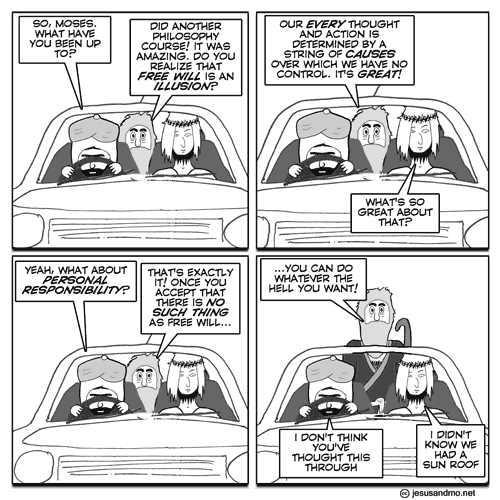Podcast: Passion for truth's nothing to apologize for, incivility is.
1. Which molecules play an important role in well-being and emotional balance?
2. What do dopamine, oxytocin, and serotonin have to do with happiness?
3. What crucial point did the Stoic and Epicurean sages of antiquity underscore?
4. Why did Montaigne ride his horse? (And a BONUS QUESTION: what startling equine event changed Montaigne's life?)
5. Aside from the importance of letting the mind wander, what important qualification does Lenoir attach to the primacy of the present moment?
6. Who pioneered Positive Psychology?
DQ:
1. Does it bother you to think of your happiness being governed by the "molecules of emotion"? Is this an objectionably reductive way of understanding subjectivity and the mind, or merely a strategically useful handle on one's state of well-being? Does it over-objectify experience, or imply a deterministic worldview at odds with your notion of free will (see my dawn post, below)?
2.Given the importance of diet, sleep, and emotional equanimity to happiness, what do you do to insure their adqeuate provision in your own daily habits and routines? What can't you do, that you wish you could?
3. If the quest for a "happiness gene" is misguided, is there a place for genetic engineering in the future pursuit of happiness? What regulations on such research would you impose, if you were Philosopher-King/Queen?
4. How do you cultivate the skill of attention? How "mindful" are you? Can every moment of life really be a source of happiness?
5. Do you agree with Woody Allen?
==
This morning's dawn post:
Choosing free will
More in class today on free will. Augustine's theological commitment to the concept is one hook, neuroscience is another. "Our brains take decisions before our minds are aware of them," reports the BBC podcast I've asked students to consider.
"But there's evidence that whether or not we have free will, believing in it is good for us." Some experiments support the claim that those who believe in free will, and act on that belief, are by various measures happier, healthier, more conscientious and ethically responsible, less liable to cheat, steal, and lie.
The "happier" claim is most arresting, or it will be for us in Happiness class this afternoon. William James, in his books but more impressively in the totality of his post-free will crisis lifetime, supports it too. One day he "just about touched bottom," the next he resolved that "my first act of free will shall be to believe in free will," and in subsequent decades he certainly seemed to find pragmatic vindication for the concept. In his own terms, he found it better for him to believe in free will. Far better. That's not proof, but neither is it irrelevant or illusory.
But is it an adequate answer to Gregg Caruso's contention (and Sam Harris's) that as a society we would be better off giving it up, even if some individuals like James would not be? Caruso:
I maintain that life without free will may actually be good for our well being, and our relationships with others, since it could tend to eradicate an often destructive form of moral anger, a kind of moral anger that's corrosive to our relationships and to our social policies...
We need to acknowledge the role that luck plays in our lives, who we are, and how we turn out... Let's give up the belief in free will, and with it, the pernicious belief in just-deserts, that people justly deserve what they get. Let's leave this adequate notion behind, lose our moral anger and stop blaming the victim. Instead, let's turn our attention to the difficult task of addressing the causes that lead to criminality, to wealth inequity, and educational inequity. Once we relinquish the belief in free will, this will allow us to look more clearly at the causes and more deeply at the systems that shape individuals and their behavior, and this will allow us to adopt more humane and more effective policies in education, criminal justice, and social policies.
Sounds great. It might be the right choice, if we have one. But I don't think it would have got William James up off the floor, when he touched bottom. I'm not sure it would have got me up out of bed this morning at 5 am. I choose to suspend final judgment on this issue. Or think I do.
5:30/6:38, 61/88
Sam Harris:
I briefly discussed the illusion of free will in both The End of Faith and The Moral Landscape. I have since received hundreds of questions and comments from readers and learned just where the sticking points were in my original arguments. I am happy to now offer my final thoughts on the subject in the form of a short book, Free Will, that can be read in a single sitting.
The question of free will touches nearly everything we care about. Morality, law, politics, religion, public policy, intimate relationships, feelings of guilt and personal accomplishment—most of what is distinctly human about our lives seems to depend upon our viewing one another as autonomous persons, capable of free choice. If the scientific community were to declare free will an illusion, it would precipitate a culture war far more belligerent than the one that has been waged on the subject of evolution. Without free will, sinners and criminals would be nothing more than poorly calibrated clockwork, and any conception of justice that emphasized punishing them (rather than deterring, rehabilitating, or merely containing them) would appear utterly incongruous. And those of us who work hard and follow the rules would not “deserve” our success in any deep sense. It is not an accident that most people find these conclusions abhorrent. The stakes are high... (continues)==
For our (my) amusement:


Quiz Question
ReplyDeleteWhat specific brain reaction do long-time meditators experience?
Discussion Question
ReplyDeleteIn Chapter 11, Lenoir makes the point that people who "ruminate" tend to be less happy than those who "move more frequently from one activity to another." Do you think this is true? Does rumination have no place in our lives or in our happiness?
I'm not sure, I feel like one could "ruminate' but also be very aware of what is going on in that moment...So I don't necessary think more people experience happiness from "moving from one activity to another". Sometimes moving from one thing to another doesn't give you the ability to really take in what is gong on in the present moment, because you would be in more of a rush. Thats just my take on it so far, lol. What do you think?
DeleteThis comment has been removed by the author.
ReplyDeleteQuiz Question:
ReplyDeleteWho developed the term "mindfulness?"